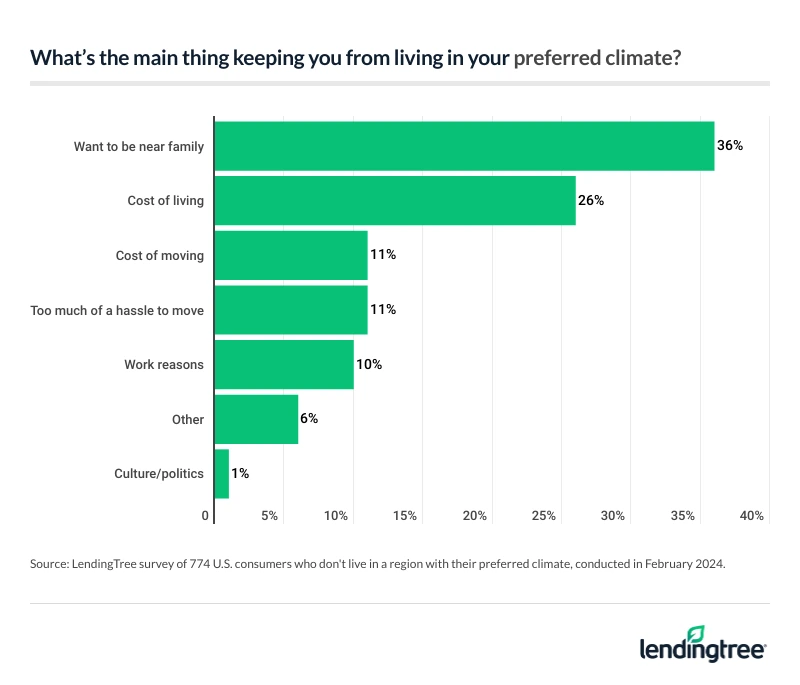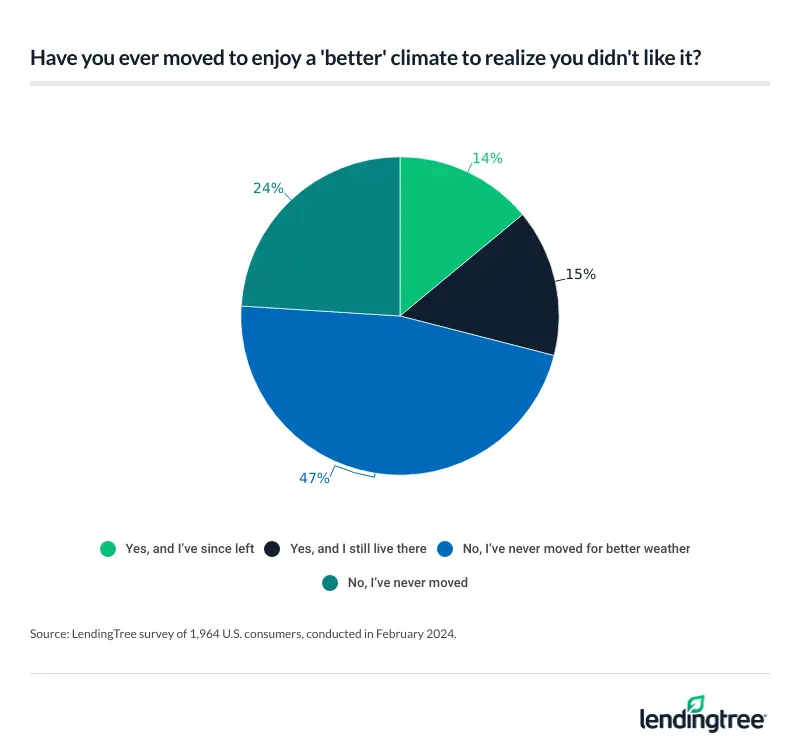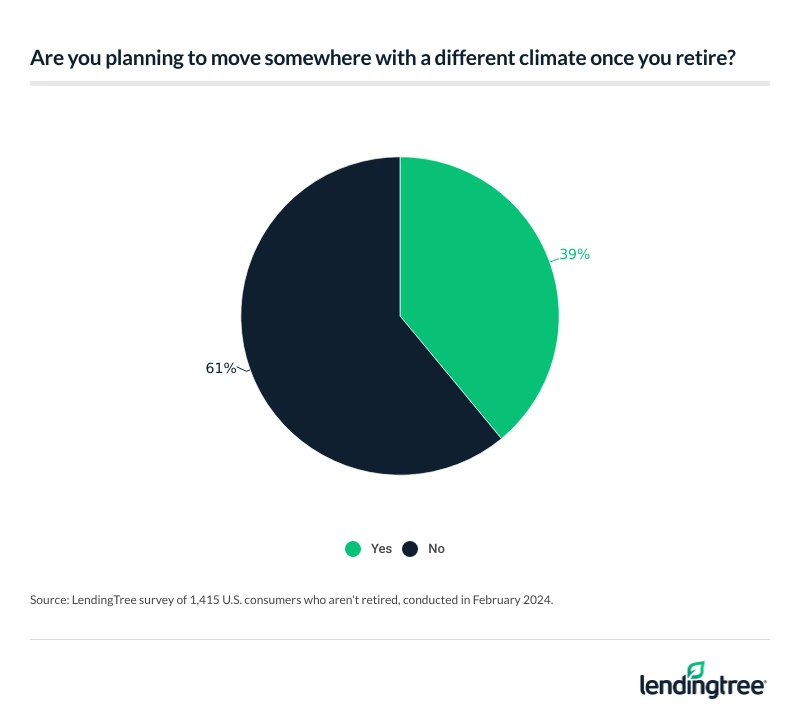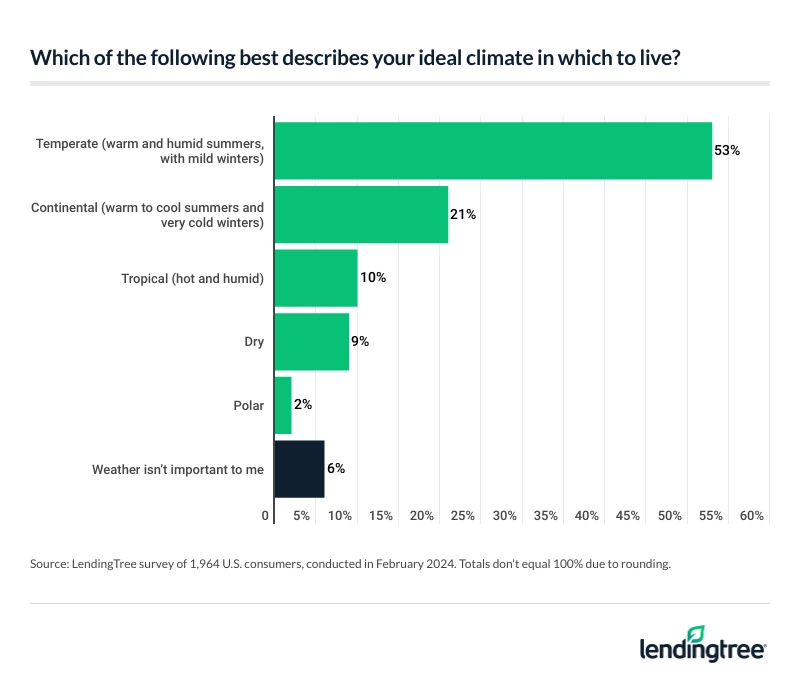61% of Americans Live in Their Ideal Climate, and 20% of Those Who Don’t Plan to Be Weather Chasers in the Next Year
Americans are hot and cold on where in the country they want to live … and sometimes that’s based on whether they’ll be hot or cold while living there.
According to the latest LendingTree survey of nearly 2,000 Americans, 6 in 10 live in a region with their preferred climate. Of those who don’t, 20% say they’re eyeing a move to their preferred climate in the next year.
Read on for more insight into what matters to Americans when they’re picking their place of residence — and how that varies by demographic.
Key findings
- Most Americans enjoy the climate where they live. 61% of Americans reside in a region with their ideal climate, with Westerners (72%) and Southerners (67%) the most content. For 37% of Americans, this was by design, meaning they factored in climate when deciding where to live.
- The weather outside takes a back seat to family, cost of living and health when putting down roots. Among those who don’t live in their ideal climate, 36% cite proximity to family and 26% cite cost of living as what’s keeping them away. Additionally, over a third (35%) of Americans say they or a family member has a health condition that makes certain climates more suitable.
- The grass isn’t always greener, despite “better” weather. 1 in 5 of those who don’t live in their preferred climate plan to move there in the next year, including a third of Gen Zers. However, 29% of Americans have previously moved for a better climate to later realize they didn’t like it. Almost half of those who’ve done so have since relocated.
- Planning for retirement involves more than finances for many. 39% of respondents who aren’t retired plan to relocate in their golden years to a different climate. Additionally, 32% of retirees have either already made the climate-driven decision to move or plan to do so in the future.
- A temperate climate is the most preferred among Americans, followed by continental and tropical. 40% say they prefer somewhere with consistent weather, while 34% prefer to experience the four seasons. Additionally, the number of daylight hours is a factor for some, as 37% say sunshine and daylight hours play a role in where they reside.
6 in 10 Americans live in region with preferred climate
Be it warm, mild, steady or wild, most people have a preference on the type of climate where they live. According to our findings, 61% of Americans hang their hats in their preferred climate. Still, that leaves 39% with hats hanging in climates other than their ideal.
Where are people most content with the weather conditions? The West leads the way, with 72% of those living there reporting they reside in their preferred climate. That’s followed by those in the South (67%), Northeast (55%) and Midwest (47%).
Men are more likely to live in their preferred climate than women — 63% versus 58%, respectively. Also, the more money people make, the more likely they are to live in their prime climate. While 56% of those who make less than $30,000 live in their preferred climate, 67% of those who make $100,000 or more do.
But is the climate driving people’s decisions about where to live? In most cases, no, as 63% say climate wasn’t a factor when they most recently decided where to live. That leaves 37% as fair-weather flockers.
Should climate play a part in your decision as to where to live? LendingTree senior economist Jacob Channel says yes — to some degree.
“The environment in which you live can play a big role in your mental and physical well-being,” he says. “Owing to that, it makes sense for people to try to settle in an area with a climate they find agreeable. Your health is important, and if living in an area with a certain climate is going to mean you’re more likely to deal with problems such as serious seasonal depression or constant asthma flare-ups, it might be best to move someplace else.”
However, Channel says weather rarely should be the only factor to consider.
“You always want to be sure that whatever area you settle in is affordable to you, and in that same vein, you’ll want to be sure you can work a steady, safe job there,” he says. “You should also consider factors like how your location will impact your relationships with family, friends and romantic partners, and whether it’ll provide you with enough entertainment or recreational activities to keep you occupied.”
Family, cost of living keeping Americans from ideal climate
Why would anyone settle in less than their ideal climate? Wanting to be near family tops the list, with 36% saying that’s why they don’t live in their preferred climate. That’s followed by the cost of living, which keeps 26% from their dream weather.

Could a shift in economic conditions change that? In some respects, Channel says, the cooling inflation growth and falling mortgage rates that are possible in 2024 could reduce or otherwise make the cost of living easier to manage for many people.
“Some may even find that making bigger purchases, like buying a home, is easier for them this year than it would’ve been in 2023,” he says. “That said, the cost of living across the U.S. probably isn’t going to significantly decrease, and plenty of people’s budgets are going to remain tight. This may mean that some are unable to move to a place with their ideal climate.”
For some, weather may be more than just a preference. It could be a matter of health for 35% who say they or a family member has a health condition where certain climates are more suitable for them. This includes 19% who cite themselves, 10% who cite a family member and 6% who cite both.
1 in 5 who don’t live in preferred climate plan to move there in next year
Will a quest for a more favorable climate cause people to move? In the next year, 20% of those who don’t already live in their ideal climate say they’ll seek sunnier (or cloudier) skies and move to their preferred climate.
- More men than women plan to make a climate-related move — 25% versus 15%.
- Gen Zers ages 18 to 27 are far more likely to say they’ll move for better weather (33%) than millennials ages 28 to 43 (22%), Gen Xers ages 44 to 59 (21%) and baby boomers ages 60 to 78 (8%).
- Those with children younger than 18 are almost three times as likely as those with children 18 or older to say they’ll move to their preferred climate in the next year — 27% versus 10%.
Climate-related move regrets? They have a few, at least for the 29% who say they’ve moved for a “better” climate only to realize they didn’t like it — 14% have since left, while 15% still live there.

Relocating during golden years? What Americans plan to do
Is retirement the time people will finally flock to their preferred climate? Our survey includes 28% of people who are already retired and 72% yet to reach their golden years. Of those not retired, 39% say they plan to move to a different climate when they conclude their career.
- Men are more likely than women to plan a retirement relocation based on climate — 44% versus 33%.
- Millennials (43%) and Gen Zers (42%) have more climate-related retirement aspirations than Gen Xers (35%).
- Nonretirees who earn the most ($100,000 or more) are more likely to say they’ll move in retirement to a different climate than those who earn the least (less than $30,000) — 44% versus 27% — while 43% of those whose earnings fall in the middle say they will.

Of those already retired, 19% say they plan to move for different weather sometime in the future, while 14% say they already moved for better weather in retirement.
Is climate a good reason to make a retirement move? Channel reminds it can be part of the equation, but there are other factors to consider before moving, such as moving costs and how well an area fits your lifestyle.
“If you’re planning on moving after you retire, you should pay careful attention to how livable your area will be as you age,” he says. “No matter how old you are, you don’t want to eat into your savings to go someplace new only to find that getting by there is much harder than you expected. This can be especially true for retirees with a limited income on which to live.”
Temperate, continental, tropical: A different kind of climate change
The ideal climate is subjective, but a temperate one (warm and humid summers with mild winters) is the hands-down favorite, with 53% choosing it as their ideal. Only 2% prefer a polar climate, and 6% say weather isn’t important to them at all.

There’s something to be said for consistency, as 40% of people say they prefer consistent weather, while 34% prefer seasonal changes. An ambivalent 26% say either is fine.
While people have preferences, climate is far from the top driver when it comes to choosing where to live. The cost of living trumps all else for most, with 41% citing it as the most important factor when deciding where to move. Family is most important for 21%, while job opportunities are foremost for 16%. In fact, climate was only named as the most important by 12%. Culture, diversity, schools and “other” each came in below 4%.
But what would people sacrifice for their ideal climate? Cost of living tops the list again, with 23% saying they’re willing to compromise it for their ideal climate. Family first? Not for the 17% who say they’d compromise for family when it comes to living in their preferred climate. Another 17% say they’re willing to compromise for job opportunities.
Do hours of daylight and sunshine drive moves? Not for most, as 63% say they didn’t play a role in their decision to live in their current location.
4 tips when moving to different climate
Before moving to a different climate, there are some things to consider to help ensure it’s a move that makes sense for you:
- Do your research before you pack your bags. A place can sound great on paper and look amazing in pictures but be total hell in person. It may seem like common sense, but it’s still worth saying: If you want to move somewhere new, you should visit there first. See if the climate is what you hoped it would be. Just because your friends or family say you’ll love living somewhere doesn’t mean you will.
- Evaluate your wants versus your needs. Someone considering a move to seek a better climate should be sure they understand the difference between wants and needs. If you need to live somewhere for health or other reasons, it can be worth it to spend extra money getting and staying there. Conversely, if you overspend on something you could live without, you might regret it. “For example, you might want to live in a secret base inside of an active volcano, but that doesn’t mean you should jeopardize your financial and physical well-being to do it,” Channel says. “However, if you live next to an unregulated, open-air, toxic waste dump, stretching your budget to get away is probably something you need to do, even if it puts you in a weaker place financially.”
- Prepare early. If you want to make a move this year, start planning for that move as soon as possible. The more time you give yourself to save for expenses like those associated with buying a new house or paying for movers, the easier covering those costs is likely to be.
- Accept where you’re at. If moving isn’t in the budget this year, you should try your best to make peace with where you live. That may be easier said than done, especially if you’re living in a truly toxic environment, but — for the most part — an area doesn’t need to be ideal to be livable.
Methodology
LendingTree commissioned QuestionPro to conduct an online survey of 1,964 U.S. consumers ages 18 to 78 from Feb. 13 to 19, 2024. The survey was administered using a nonprobability-based sample, and quotas were used to ensure the sample base represented the overall population. Researchers reviewed all responses for quality control.
We defined generations as the following ages in 2024:
- Generation Z: 18 to 27
- Millennial: 28 to 43
- Generation X: 44 to 59
- Baby boomer: 60 to 78
View mortgage loan offers from up to 5 lenders in minutes

